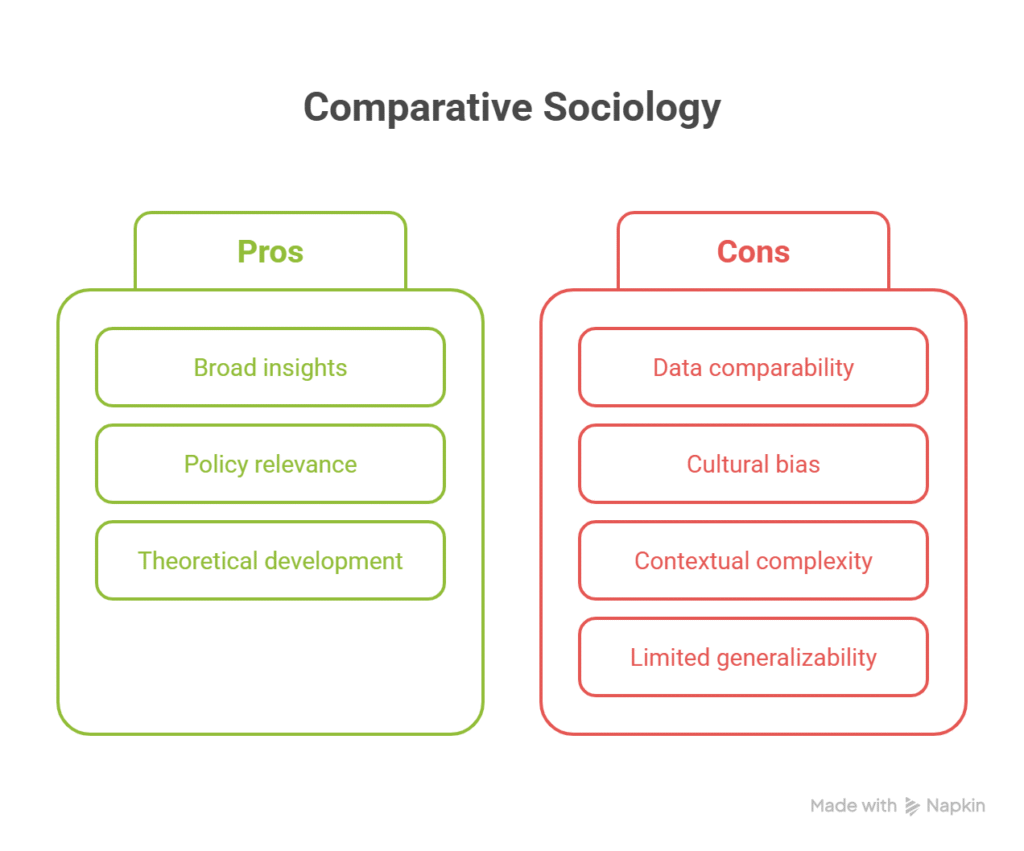Introduction
The comparative method is a fundamental approach in sociology that enables researchers to analyze social phenomena across different regions, cultures, and societies. In regional sociology, this method is particularly valuable for understanding variations in social structures, institutions, and processes across geographical and cultural boundaries. By comparing different regions, sociologists can identify patterns, test theories, and develop a deeper understanding of how social forces operate in diverse contexts.
This article explores the comparative method in regional sociology from a sociological perspective. It discusses the significance of comparative research, its methodological approaches, key challenges, and its contributions to sociological theory and practice. The discussion also highlights notable studies that have employed comparative methods to enhance our understanding of regional social dynamics.

The Significance of the Comparative Method in Regional Sociology
Comparative sociology aims to explain social processes by comparing similarities and differences across societies or areas. In regional sociology, this method is crucial for several reasons:
- Understanding Regional Variations
Societies and regions differ in terms of economic development, political systems, cultural norms, and social institutions. The comparative method helps sociologists analyze how these differences shape social behavior, inequality, and development. - Testing Sociological Theories
Many sociological theories are developed in specific regional contexts (e.g., Western societies). Comparative research allows sociologists to test whether these theories hold true in different regions or if they require modification. - Informing Policy and Development
By comparing regions, policymakers can identify best practices and lessons from different contexts. For example, comparative studies on education systems, healthcare, or urbanization can guide regional development strategies. - Highlighting Global and Local Interactions
Globalization has increased interconnectedness, yet local and regional differences persist. Comparative research helps sociologists examine how global forces interact with regional particularities.
Methodological Approaches in Comparative Regional Sociology
The comparative method in regional sociology employs various research strategies, including qualitative, quantitative, and mixed-method approaches. Some key methodological techniques include:
1. Case-Oriented Comparison
This approach involves in-depth analysis of a few regions or cases to understand their unique social dynamics. Max Weber’s comparative study of religions and economies is a classic example. Researchers may use historical, ethnographic, or institutional analysis to compare regions.
2. Variable-Oriented Comparison
Here, researchers focus on specific variables (e.g., poverty rates, education levels) across multiple regions to identify correlations and causal relationships. This method frequently makes use of statistical techniques.
3. Cross-Regional Surveys
Surveys conducted across different regions allow sociologists to gather comparable data on attitudes, behaviors, and social conditions. One example of a cross-regional comparative study is the World Values Survey.
4. Historical-Comparative Analysis
This approach looks at how regional differences are shaped by historical processes. For instance, comparing the industrialization of Europe and Asia helps explain divergent economic trajectories.
5. Ethnographic Comparisons
Anthropologists and sociologists often compare cultural practices, kinship systems, or social norms across regions using ethnographic fieldwork.
Key Challenges in Comparative Regional Sociology
Despite its advantages, the comparative method faces several challenges:
- Data Comparability
Different regions may use varying definitions and measurements for social indicators (e.g., poverty, unemployment). One of the main challenges is ensuring data comparability. - Cultural Bias and Ethnocentrism
Researchers may unintentionally impose their own cultural perspectives when interpreting regional differences. Avoiding ethnocentric biases is essential for objective analysis. - Complexity of Social Contexts
Regions have unique historical, political, and cultural backgrounds. Simplistic comparisons may overlook these complexities. - Limited Generalizability
Findings from one region may not apply to another due to contextual differences. Comparative research must balance generalization and specificity.

Contributions of Comparative Regional Sociology
Sociological knowledge has been greatly enhanced by the comparative method in a number of areas:
1. Urban and Rural Studies
Comparative research has revealed how urbanization processes differ across regions. For example, Latin American cities experience different patterns of informal settlements compared to African or Asian cities.
2. Economic Development and Inequality
Studies comparing capitalist and socialist economies, or developed and developing regions, have provided insights into the causes of inequality and growth.
3. Political Sociology
Regional differences in governance, social movements, and state-society relations can be explained by contrasting authoritarian and democratic regimes.
4. Gender and Family Structures
Cross-regional comparisons have shown how cultural norms influence gender roles, marriage systems, and family dynamics.
5. Migration and Transnationalism
Comparative studies on migration patterns highlight how regional economic disparities and policies shape global mobility.
Notable Comparative Studies in Regional Sociology
Several influential studies have employed the comparative method to advance regional sociology:
- Barrington Moore’s Social Origins of Dictatorship and Democracy (1966)
Moore compared the historical paths of different regions (e.g., England, Japan, India) to explain why some developed democratic institutions while others became authoritarian. - Gøsta Esping-Andersen’s The Three Worlds of Welfare Capitalism (1990)
This work compared welfare regimes in Europe, North America, and other regions, identifying distinct models of social policy. - Immanuel Wallerstein’s World-Systems Theory
Global economic disparities were explained by Wallerstein’s comparative study of core, semi-periphery, and peripheral regions. - Robert Putnam’s Making Democracy Work (1993)
Putnam compared regional governance in Italy, showing how social capital varies across regions and affects political performance.
Conclusion
The comparative method is indispensable in regional sociology, offering powerful tools for analyzing social phenomena across diverse contexts. By systematically comparing regions, sociologists can uncover underlying social mechanisms, challenge ethnocentric assumptions, and contribute to both theoretical and policy-oriented knowledge. Despite methodological challenges, comparative research remains vital for understanding the complexities of regional social dynamics in an increasingly interconnected world.

As globalization continues to reshape regional identities and structures, the comparative method will remain a key approach for sociologists seeking to understand the interplay between local and global forces. Future research should focus on refining comparative techniques, integrating interdisciplinary perspectives, and addressing emerging regional issues such as climate change, digital divides, and transnational migration.
Through rigorous comparative analysis, regional sociology can continue to provide valuable insights into the diverse and ever-changing social landscapes of our world.
Do you like this this Article ? You Can follow as on :-
Facebook – https://www.facebook.com/hubsociology
Whatsapp Channel – https://whatsapp.com/channel/0029Vb6D8vGKWEKpJpu5QP0O
Gmail – hubsociology@gmail.com
Topic Related Questions
5-Mark Questions (Short Answer Type)
- Define the comparative method in sociology.
- Why is the comparative method important in regional sociology?
- Name two key challenges faced in comparative regional sociology.
- What is the difference between case-oriented and variable-oriented comparison?
- Give an example of a sociological study that used the comparative method.
- How does ethnocentrism affect comparative research?
- What is the role of cross-regional surveys in comparative sociology?
- Explain the concept of “data comparability” in comparative studies.
- Name one sociologist known for using the comparative method and their contribution.
- How does globalization influence comparative regional studies?
10-Mark Questions (Brief Essay Type)
- Discuss the significance of the comparative method in understanding regional social structures.
- Compare and contrast qualitative and quantitative approaches in comparative regional sociology.
- Explain how historical-comparative analysis helps in studying regional development.
- What are the advantages and limitations of using the comparative method in sociology?
- Discuss Barrington Moore’s Social Origins of Dictatorship and Democracy as an example of comparative sociology.
- How does the comparative method contribute to policy-making in regional development?
- Analyze the role of cultural context in comparative sociological research.
- What are the key methodological steps in conducting a comparative regional study?
- How does Esping-Andersen’s Three Worlds of Welfare Capitalism illustrate comparative sociology?
- Discuss the impact of migration patterns in comparative regional sociology.
15-Mark Questions (Long Essay Type)
- Critically examine the methodological challenges in comparative regional sociology with suitable examples.
- “The comparative method bridges the gap between macro and micro sociology.” Discuss this statement with reference to regional studies.
- Evaluate the contributions of world-systems theory (Wallerstein) to comparative regional sociology.
- How does the comparative method help in understanding urbanization differences across Global North and Global South?
- Discuss the role of ethnography in comparative regional sociology with case studies.
- Compare the welfare state models of Europe and East Asia using the comparative method.
- How can the comparative method be applied to study gender inequality across different regions?
- “Comparative sociology is essential for testing the universality of social theories.” Justify.
- Analyze Robert Putnam’s Making Democracy Work as a landmark study in comparative regional sociology.
- Discuss the future of comparative regional sociology in the context of globalization and digital transformation.
